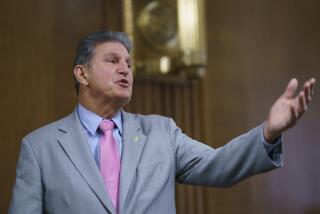CURRENCY : Budget, Trade Deficit Fears Hurt Dollar
- Share via
NEW YORK — The dollar closed sharply lower Friday, shaken from its perch by renewed fears over America’s twin deficits--budget and trade.
A press report that the U.S. budget deficit for the next fiscal year would be above the legal limit of $167 billion, set by the Gramm-Rudman law, was the culprit that put all financial markets on the defensive early in the day.
Dealers said the dollar’s vulnerability is linked to a belief that the currency cannot hold its own unless there is pronounced central bank intervention to prop it up, as there was earlier this week.
The Labor Department reported Friday that unemployment fell 0.1% to 5.8% at the end of 1987--a figure considered bullish for the dollar and that was expected to move the currency sharply higher.
But, “it rose only marginally,” said James Vick, vice president and senior corporate trader at Manufacturers Hanover Trust Co. “People with long dollar positions decided to liquidate them.”
As a result, the dollar fell nearly two pfennigs against the West German mark in New York, slipping to 1.6365 marks from 1.6548 marks late Thursday.
Vick said traders were “disappointed and frustrated” that the market did not respond more positively to the employment picture.
In earlier European trading, the dollar finished higher although it came under pressure following the published report that the U.S. budget deficit might exceed the ceiling set by law.
The Washington Post reported that the deficit for fiscal 1989 could rise to $167 billion, $31 billion above the limit set by the Gramm-Rudman deficit reduction law.
“The selloff was largely a knee-jerk reaction,” one dealer said. “It’s not something important, like a trade figure.”
The U.S. merchandise trade report for November is due to be released Jan. 15, and traders were beginning to look toward that number, Vick said.
“It looks like the U.S. fundamentals are . . . coming back to the fore,” he said, referring to the markets’ preoccupation earlier this week with central bank intervention and with reports of an agreement among the United States, Japan and West Germany to maintain the dollar within a specific range against the Japanese yen.
The dollar’s strength in Europe was attributed to comments Thursday by Federal Reserve Board Governor Manuel Johnson, who said that the Fed “welcomes a stronger dollar.”
Johnson said central bank intervention to support the dollar should be a warning to speculators that “betting against the dollar at these low levels is very risky business.”
The dollar rose in Tokyo for a fourth consecutive day, closing at 129.45 Japanese yen, up from 128.95 yen. In London trading later Friday, the dollar was lower at 129.10, and in New York it slipped to 128.35 yen from 129.45 yen late Thursday.
In London, the dollar gained against the British pound. It cost $1.8070 to buy one pound, cheaper than Thursday’s $1.8135. In later New York trading, the pound rose to $1.81825 from $1.8102 late Thursday.
Tables, Page 7
More to Read
Inside the business of entertainment
The Wide Shot brings you news, analysis and insights on everything from streaming wars to production — and what it all means for the future.
You may occasionally receive promotional content from the Los Angeles Times.










